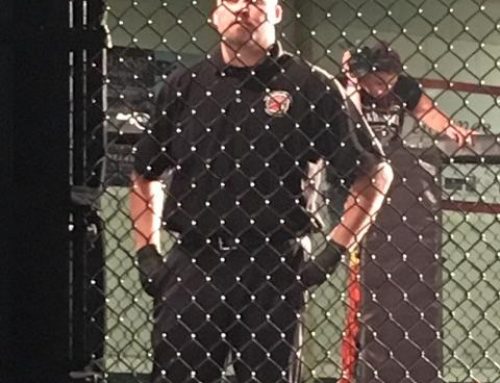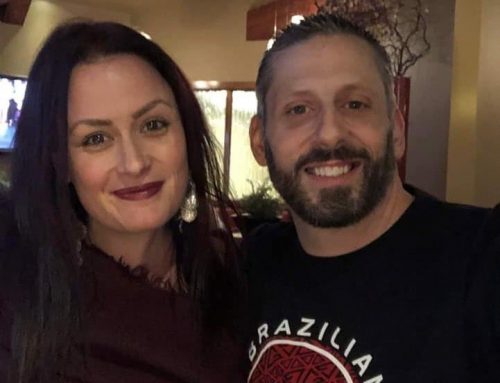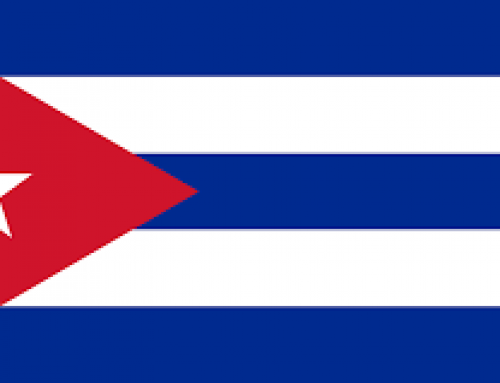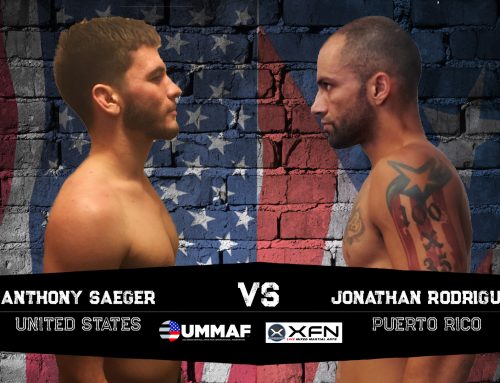Interview by Dallas Hall
After a vote by the IMMAF Board of Directors at a meeting to expel UMMAF as the representing IMMAF federation in the United States, UMMAF and IMMAF are headed to arbitration to settle the matter. I sat down with UMMAF President Ryan Brueggeman to discuss the situation.
(DH): IMMAF voted to have UMMAF expelled as the United States federation under them. What lead to this decision?
(RB): Close to 2 years ago, a former UMMAF board of directors’ member and a regional director, split off from UMMAF and formed their own organization. During this time, they sent a document to IMMAF alleging UMMAF of non-compliance with some of our own by-laws under the Ted Stevens Olympic Sports Act. This document along with what we assume were followed by emails and phone calls is what started this. The other fallout that occurred was that IMMAF placed UMMAF into “Special Measures” and originally gave 90 days to comply.
(DH): Were the accusations by the two former UMMAF members true?
(RB): Some yes, but by and large no. In a way I have realized, it was a blessing in disguise. The Ted Stevens Act is a federal law that governs the way an approved USA Olympic sport governing body should conduct themselves. The issue UMMAF had was that amateur MMA is not yet an approved Olympic sport, nor did we have a USOC mandate as the official and only governing body in the USA, so it was impossible to legally comply with all of the original statutes that UMMAF had in place, though I completely understand that the founders of UMMAF wanted to get as close to Olympic style governance as they could. At the time that the IMMAF Special Measures were put in place I was the UMMAF Vice President and was charged with rewriting the UMMAF by-laws, and I felt in order to come into compliance with IMMAF, we must change our statutes, so they closely mirror those of IMMAF with a few exceptions.
(DH): You stated that UMMAF was placed into “Special Measures” and given 90 days to comply. Did you comply with the deadline?
(RB): When UMMAF was informed that we were placed into these “Special Measures” we immediately requested arbitration with IMMAF as was provided for by IMMAF statute 43. This request, as made by then UMMAF President Frank Babcock was never replied to. Due to IMMAF not replying to the original request as required under their own statutes, UMMAF had to either make changes or face expulsion. As we began to make those changes, then UMMAF President Frank Babcock and I met with most of the IMMAF Board of Directors in Rome, Italy, and discussed the difficulties we faced with the time frame we were given. In response, IMMAF Vice President George Sallfeldt told us “not to worry about the deadline, and that IMMAF would help UMMAF through the process of changes and would then come out with a series of articles voicing support of UMMAF as the designated IMMAF federation within the USA.”
(DH): You said earlier that making changes to your statutes was a good thing, but you seem to be criticizing IMMAF’s request. How can it be both?
(RB): As an organization, we would be 100% wrong to believe that we cannot evolve and be better. It does not matter if you are UMMAF, IMMAF, Ford Motor Company, the USOC or the NFL. You have to strive to be better all of the time. If not, you are stagnant. The “Special Measures” showed us areas that we could certainly improve on, but also could have opened UMMAF up to serious violations of items such as data privacy laws within the USA.
(DH): Did you inform IMMAF that laws here within the USA prevented you from complying with some of the “Special Measures” directives?
(RB): Yes, several times, and most recently to IMMAF Board of Director member Stewart Brain. His response highlighted to me how little IMMAF knows about compliance with USA law. Mr. Brain stated that IMMAF is not beholden to the laws of the United States, and he is 100% correct. The issue we as UMMAF have is that because we operate and are registered within the United States, we are legally obligated to comply with laws within this country, as would any federation here. The bottom line on this, is that any federation that chose to comply with 100% of IMMAF’s “Special Measures” would be in violation of laws within this country, and we as an organization in the USA, are unwilling and unable to violate the laws of this country.
(DH): It seems that an international organization such as IMMAF would understand that. How can IMMAF force you to violate the laws of your own country?
(RB): This is a flaw in the IMMAF by-laws. IMMAF Article 9.2 states that a member federation must “comply unreservedly with the Statutes, Regulations, directives and decisions of IMMAF.” This statute does not recognize that IMMAF is placing their member national federations in violation of their own nation’s laws, especially in the United States. It is also in direct conflict with IMMAF Article 47 which states “No discussion or voting by the IMMAF shall infringe in any way on the freedom and independence of any Member, who shall, at all times, retain complete independence and control over all matters falling within their field or activity.” This is an incredibly significant article because we feel that IMMAF has certainly infringed on the governance of UMMAF activities in a wide range of topics falling within our field. That infringement is clearly not allowed given the language in Article 47.
(DH): Can you detail those infringements to everyone?
(RB): Yes, however given the pending arbitration hearing, we choose to let the arbitration panel hear those arguments first before they go public. This is a principle we have adhered to throughout this process, but we cannot say the same for IMMAF.
(DH): What do you mean by that? Has IMMAF gone public?”
(RB): Unfortunately, yes. IMMAF has published a few statements regarding the situation and have even told other federations and members of certain committees that UMMAF being expelled is a done deal. It is not done at all. Along with the upcoming arbitration hearing we have several avenues that we could pursue. The IMMAF Ethics Committee could be petitioned, and then there must be a General Assembly Vote of 50%+1 of the voting member federations for an expulsion to be complete. Then there is also an avenue in which the matter could be brought before the Court of Arbitration for Sport (CAS), in Lausanne, Switzerland.
(DH): Are you aware that IMMAF has stated they are in talks with CAMO in California to possibly replace UMMAF?
(RB): Yes. We have zero issues with CAMO as an organization. What we do take issue with is IMMAF essentially telling the world that UMMAF is already out. The legal process has yet to be completed and IMMAF has shown a disregard for due process as provided for in their own statutes before making such announcements. What we feel they do not understand is that ANY organization in the USA would face the same difficulties we have had in terms of unifying the sport in the USA.
(DH): In the IMMAF article, they state their vision for a USA federation. They mentioned competing for sanctioning authority. Is this something UMMAF does?
(RB): Not at all. In certain states sanctioning authority is granted through an application process such as in Nevada, New York, and Florida. In others the state commissions retain the authority to sanction amateur MMA on their own. It is in these states where we have submitted an amateur rule set to the commissions for consideration and even given a presentation to the ABC, but to say we challenge the state commissions for sanctioning authority is not accurate at all. UMMAF has not even filed a new application to be a sanctioning body in a new state in over 2 years. We are content to remain in the states we are welcomed in by the state athletic commissions and utilize our club membership programs to expand our reach. There is a point I would like to make here. There was a time that all competitors were vetted before IMMAF competition to ensure that professional MMA techniques had not previously been used in competition. Had a fighter been found to have used elbow striking techniques for example, then that athlete would not have been allowed to compete at IMMAF competition. This was the reason we submitted rule sets for consideration by the state commissions. We wanted to ensure that every amateur had an opportunity to compete at IMMAF tournaments and not be disqualified because their state might allow techniques as an amateur that IMMAF did not.
(DH): So, you are saying that even if a state commission allowed elbows as an amateur that IMMAF would not allow them to compete?
(RB): In some cases, yes. I was on the athlete review committee for 3 years and had to watch fights to ensure the athletes were indeed amateurs. IMMAF has altered the criteria now so that an amateur as defined by the state commissions is acceptable. As long as there is not a pro record on file somewhere, then the athlete is allowed to compete, but there could still be a few questions to be answered before that happens.
(DH): What other issues could keep an athlete from competing at IMMAF event?
(RB): Primarily the costs involved. The process to get to the IMMAF World Championships can be quite expensive for an amateur athlete. For example, to qualify for the USA Team, an athlete must compete at the UMMAF National tournament or as was the case last year, go to one of four tryouts we hosted in all 4 regions of the country. To do this the athlete typically pays for their travel and often the travel costs of their coaches too. They also pay for their hotels in many cases. It just depends on the venue type and location. If the athlete qualifies for the World Championships, they must pay for round trip airfare for themselves and any coaches they wish to bring to the tournament – which for 3 years has been held in Bahrain, then an entry fee of nearly $900 per athlete and another $900 per coach. In fairness, that entry fee covers hotel and in some cases food etc., but it is still a lot of money for an amateur athlete, especially when they have to take off from work, and coaches have to leave their gyms etc. Do not get me wrong, it is a great experience for any athlete, but more times than not we end up having to bring the fighters that can afford to go and that does not always translate to the best fighter to enter the tournament.
(DH): Why doesn’t UMMAF pay for the athletes travel and entry fees?
(RB): I am really glad you asked this question. A lot of developed countries under the IMMAF umbrella have sports ministries that control government funding for athletes that travel to IMMAF competitions as well as other sports events. We simply do not have that in the USA. We have the USOC. The USOC will not recognize any sport that is not an approved Olympic sport, therefore funding is not available from them. To complicate matters further, UMMAF is a 501.c3 non-profit organization, meaning funding is difficult to come by. Previously, UMMAF charged $35 per year for an annual membership to the organization. This typically happened at UMMAF sanctioned events where we require fighters to license under our sanctioning. IMMAF wanted us to convert our programs to club membership whereby clubs could register to be members of UMMAF and have voting rights within the organization. To do this we created an extensive program to benefit the clubs. You simply cannot ask a business to join your organization for a fee, but not provide benefits for that money. We are hoping that program takes hold and recovers post COVID -19 which has seen 27 UMMAF registered clubs go out of business. Getting back to funding the athletes for tournaments, we did the math on this and the average cost per athlete to compete is around $2200 for round trip flight and entry fee. That is just the athlete, not their coach. If you include a coach, they want to bring then double that number to $4400. There are 14 weight classes so multiply that by $4400. It would cost UMMAF over $61,000 just to send a team to one IMMAF event assuming we only had one athlete per weight class, but depending on your position in the world rankings, you could send two athletes per weight class. Now that is just for the world championships. If the athletes choose to stay internationally ranked and seeded, they must attend other IMMAF events such as the other continental events in Europe, Asia and Africa and Oceanic countries. Those entry fees are typically a bit cheaper but assuming the national team competes at all of them it is a huge expense annually.
(DH): Has IMMAF been made aware of the difficulties in fundraising for any USA team.
(RB): Yes, in 2017 I sent a detailed email to IMMAF President Kerrith Brown outlining this and have had several conversations with IMMAF CEO Densign White about it.
(DH): What did they say?
(RB): It has been varied. The IMMAF President said that the information would be passed to an IMMAF Technical Team and they would formulate a plan, but I have not received a plan in over 3 years since. The IMMAF CEO said he did not understand our difficulty because the USA is “the richest country in the world”. It is this attitude that clearly demonstrates to me that IMMAF just does not understand the dynamics here in this country, the financial strains the amateur athletes and their coaches are under as well as governmental laws and regulations from state to state. That is what really concerns me. Any federation in the USA will have to deal with these financial burdens and IMMAF just has not been transparent in communicating this information and cost structure.
(DH): So why fight to stay part of IMMAF? It seems obvious that it is an uphill fight.
(RB): This argument is bigger than just IMMAF and UMMAF. It is about fairness and transparency. UMMAF went through a period where we could have been more transparent and forthcoming within the framework of United States laws with our members. We own that. IMMAF however has violated its own statutes in our opinion and overstepped its authority. If it can happen to us in the USA it can happen to anyone. An international governing organization for a sport seeking Olympic inclusion simply cannot behave like this. The premature announcements of UMMAF expulsion, among other things cannot be allowed. UMMAF wants to see MMA in the Olympic games as much as any other federation out there. We want to compete internationally as much as anyone. We just want IMMAF to take a step back and really look at what it is doing because right now IMMAF is outpacing what the federations can do legally in some of their respective countries.
(DH): Can anything good come out of the arbitration?
(RB): I think so. My hope is that both organizations look internally and realize there is room for a lot of improvement in their dealings with each other. So far, we have had no indication that IMMAF feels they have been wrong about anything. UMMAF on the other hand took a hard look at itself and made a great deal of improvements by recognizing we were wrong in some areas.
(DH): Suppose arbitration does not go your way. What happens next?
(RB): Great question. UMMAF will continue to expand its club membership and provide services and benefits for these gyms. They are struggling and need our help. We will continue to regulate events for promoters where we are legally licensed to do so and we will also continue to provide for country-to-country competition with the United States. In terms of an international organization to support, we have options there that I will make available in the event we need to go down that path. IMMAF has been told that UMMAF could potentially disband and reform into another organization representing the USA. That was told to IMMAF CEO Densign White and IMMAF Director Tom Madsen in an effort to show cooperation for the effort of Olympic recognition, however those overtures were not responded to, so I see no reason to disband the organization, nor does our board of directors.
(DH): More than once you stated that you have information that you do not want to divulge yet regarding the UMMAF and IMMAF situation. What is that reason?
(RB): It simply is not right at this point to do so. IMMAF has some exceptionally good people within the organization that are professional and ethical. I think culture and laws are playing a huge part in these disagreements. It is our stance to just wait for the Arbitration committee to rule then make our next moves based on their decisions. We can circle back and talk later about what those moves we will be making are.
(DH): Will you turn over those documents and evidence to the public here in the USA?
(RB): Let us not get ahead of ourselves. We still feel this relationship can be salvaged and as of today we support IMMAF. However, I want to be truly clear about something Dallas and you can take this to the bank. We have emails and documentation for everything we have said. We have not exaggerated or been untruthful. In the event that statement is challenged, then we will discuss releasing what we need to release to prove ourselves. It is because of this we feel confident that the arbitration committee, though an IMMAF committee, will rule in our favor and both organizations can repair the damaged relationships and move forward together.
(DH): Thank you Ryan, we look forward to sitting down with you after the hearing.
(RB): Thanks Dallas.






